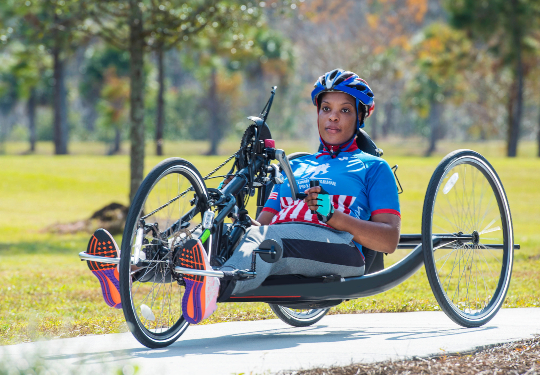Gratitude: How It Helps More Than You Might Think

The benefits of showing gratitude are deeper than we may realize. Although it’s a simple action often found among self-care tips and inspirational social media posts, it can have a lasting positive ripple effect for you and others.
Gratitude increases your energy. We often focus on the broad benefits of gratitude: reducing stress, anxiety, and depression. But we also enjoy a significant energy boost because we’re not spending as much of our resources coping with mental health issues.
Navy veteran Sharona Young manages living with multiple sclerosis (MS), but she still finds the energy to remain active in adaptive sports such as tennis and handcycling.
“I choose to focus on being grateful for the things I do have and that I can do,” Sharona said. “It’s exhausting spending energy being upset and angry. Instead of saying, ‘Oh well, I can’t go out and walk two miles like I want to,’ I challenge myself to see how far I can get with my walker before I need to sit down. It gives me motivation to see how much I can push myself.”
Gratitude reduces pain. People who kept an online gratitude journal for two weeks reported better physical health, including fewer headaches, less stomach pain, clearer skin, and reduced congestion, according to a Greater Good Science Center study. Positive emotions stimulate the release of endorphins, making you less sensitive to pain.
Gratitude connects you with others. When you express appreciation to someone, it’s often a pleasant surprise, and they feel touched. Sometimes we underestimate this positive effect and instead worry about making the other person uncomfortable. Showing gratitude extends the positive benefits beyond yourself to the recipient.
Gratitude increases resilience. A study published in the Journal of Personality and Social Psychology found gratitude increased resilience after 9/11. The study notes that positive emotions are active ingredients in thriving despite adversity. When you stop to think about what’s good in life, especially during rough times, it can help keep you moving forward and focused on positivity.
“Being grateful helps me find other things that I enjoy, and I’ve learned new things that otherwise I wouldn’t have taken the time to explore,” Sharona said. “A lot of the time, it’s small things, not necessarily big things like learning a new sport. I’ve discovered I like scrapbooking. Scrapbooking is something I can focus on if I don’t have the energy to move around too much. I’ve also been learning how to do website coding, and it’s something I’ve found I really enjoy that I can do anywhere.”
Gratitude can become an addiction. One of the best parts of practicing gratitude is that the more we do it, the more we want to do it. Dopamine releases in the brain every time a person expresses or receives gratitude. That neurotransmitter release forms a connection between the behavior and feeling good. And who doesn’t want to feel good more often?
Expressing and receiving gratitude is a habit that builds on itself. Although you might feel good in the moment, it also shifts your frame of mind and keeps the positive ripples flowing. Eventually, it becomes part of who you are and positions you and others to continue experiencing benefits as long as you practice it.
About Wounded Warrior Project
Since 2003, Wounded Warrior Project® (WWP) has been meeting the growing needs of warriors, their families, and caregivers — helping them achieve their highest ambition. Learn more.